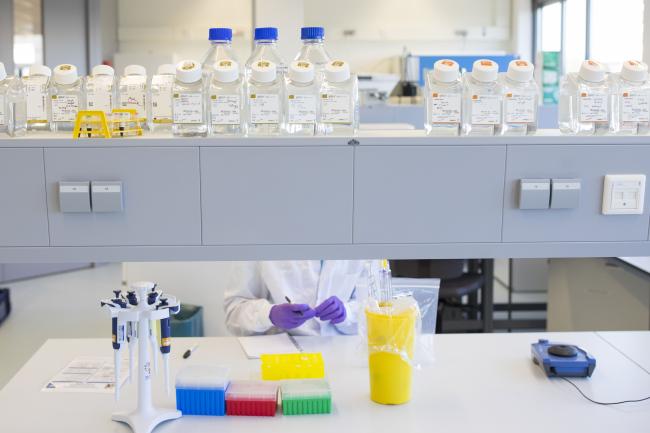(Bloomberg) -- Gilead Sciences Inc (NASDAQ:GILD). agreed to pay $5.1 billion to raise its stake in biotechnology company Galapagos NV to deepen its research into inflammatory diseases and other disorder, sending the Belgian drugmaker’s stock to an all-time high.
The deal is the largest Gilead has executed since new Chief Executive Officer Dan O’Day took the reins in March as he attempts to bolster the San Francisco giant’s drug pipeline. Gilead is in danger of becoming a victim of its own success after launching some of the top drugs of all time, its bestselling hepatitis-C franchise. Sales from those therapies have since declined due to increased competition.
Under the agreement, Gilead, which will pay $3.95 billion upfront to Mechelen, Belgium-based Galapagos and invest $1.1 billion to raise its stake to 22% from 12.3%, the companies said in a statement. The investment, at 140.59 euros a share, is 9.7% higher than the Belgian company’s closing price on Friday. Galapagos shares surged as much as 17% on Monday, reaching 149.55 euros a share.
“Gilead will significantly expand its pipeline in a smart and financially savvy expanded partnership deal with Galapagos, essentially gaining options on everything in their pipeline without having to acquire the company full out,” Jefferies analysts including Michael J. Yee and Andrew Tsai wrote in a note.
As Gilead seeks to fill the growing hole left from its hepatitis drugs, the Galapagos announcement may signal a shift in focus. The smaller biotech has no oncology programs and instead focuses on research into diseases that have to do with inflammation and fibrosis, which is a kind of internal scarring.
Gilead has also had research programs in such diseases, including through its collaboration with Galapagos, though some had speculated it may stake its future on cancer. Gilead is already the biggest shareholder of the Belgium company before the increase in stake, according to data compiled by Bloomberg. Now it gets the option to license all of Galapogos’s future, late-stage drug candidates.
Gilead CEO
O’Day, who joined Gilead from cancer giant Roche AG, said he’s not done making good on his promise to expand the pipeline. He noted the deal almost doubles Gilead’s research capacity and establishes a strong research base in Europe where the company has historically not been as active.
“In no way is this the only thing that we’re looking at or the only thing that we’re going to do,” O’Day said in an interview. “You can look at this like it’s the beginning.”
Gilead and Galapagos held talks about an expanded partnership prior to O’Day joining the company. He was briefed on those discussions after taking the top job and within the first couple of weeks, got to know the CEO of Galapagos better. Following those talks, the pair decided to being finalizing the agreement.
Jobs in Europe
This is a “science-driven deal,” Onno van de Stolpe, founder and chief executive officer of Galapagos, said in an interview. Gilead will be taking on more of the commercial side for Galapagos, helping the smaller company to focus on research. “We can now do more of what we’re good at.”
The money being invested beyond the equity stake will be used largely to double Galapagos’s R&D staff to 1,000 from 500 over an unspecified time, Van de Stolpe said. Those jobs will be added in Belgium, the Netherlands and France. “It’s massive funding -- we don’t have a detailed plan yet on how to spend it,” he said.
The pact includes a provision in which Gilead’s stake could rise to 29.9%, if Galapagos shareholders approve two warrants. The companies were already partners on an experimental drug for rheumatoid arthritis. That drug, filgotinib, hit its main goal in a late-stage study in March, triggering the Belgian biotech company’s shares to surge by the most in six months.
Galapagos shares have risen 59% since the start of the year, compared with the 5.9% gain in Gilead’s stock.
O’Day had a reputation as a dealmaker while at Roche, likely one of the reasons he was selected for Gilead’s top job at a time when the company needs to look externally to drive growth. He said that in this case, the companies opted for a partnership-style deal rather than a full takeover because full mergers can often destroy innovation as research and executive teams disband. Roche’s deal philosophy is much the same with the Swiss giant opting to leave many its units independently managed, even if it owns them in full.
Gilead spent about $12 billion to buy Kite Pharma in 2017 for its research into a cutting-edge therapies known as CAR-T. While the treatments can prove near-miraculous for some patients, CAR-Ts have yet to become large sales drivers, falling far below the revenues Gilead needs to replace declining sales from its hepatitis-C franchise.
Gilead is not the only large company with fading blockbusters. In June, AbbVie (NYSE:ABBV) agreed to buy Allergan (NYSE:AGN) in a $63 billion megadeal in a bid to replace its bestselling Humira, the bestselling drug in the world. Celgene Corp (NASDAQ:CELG). faced similar questions as the patent of its bestselling cancer drug aged before Bristol-Myers Squibb (NYSE:BMY) agreed to buy it for $74 billion in January.
